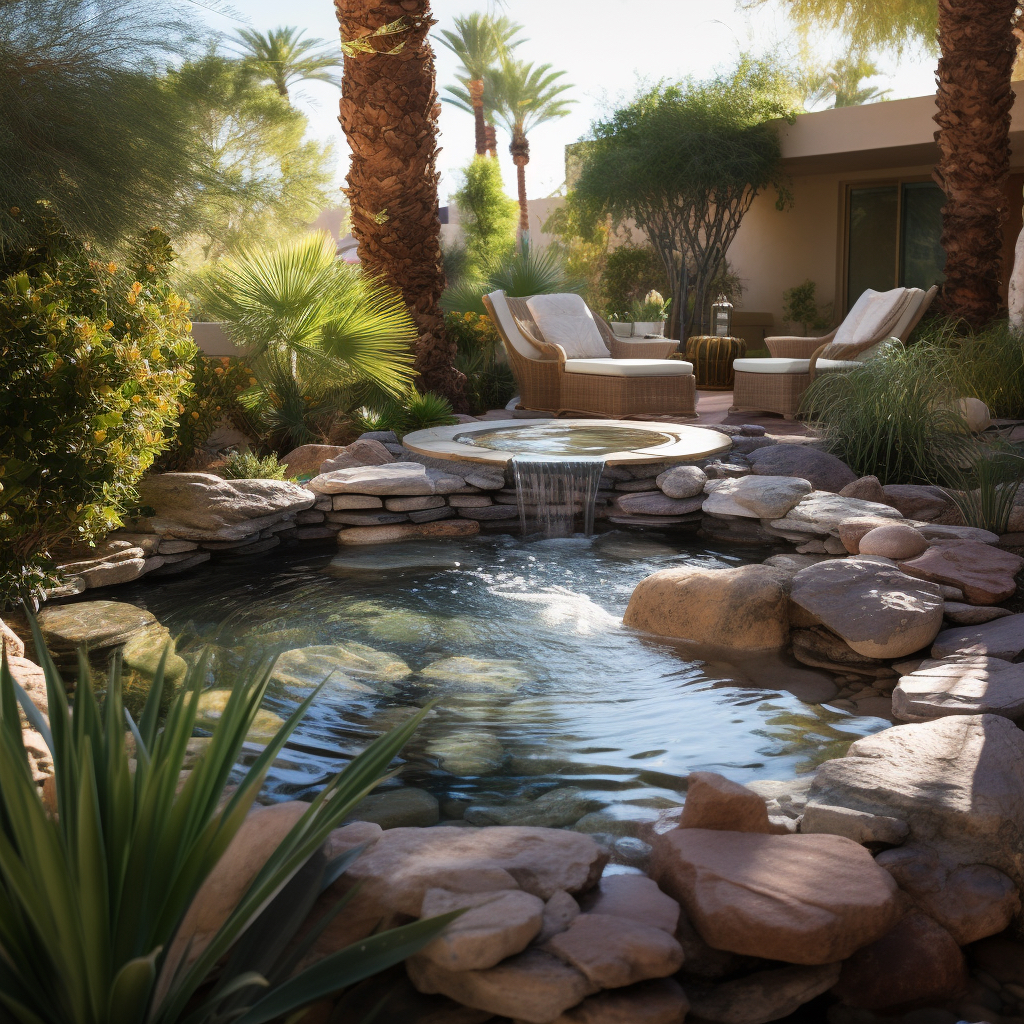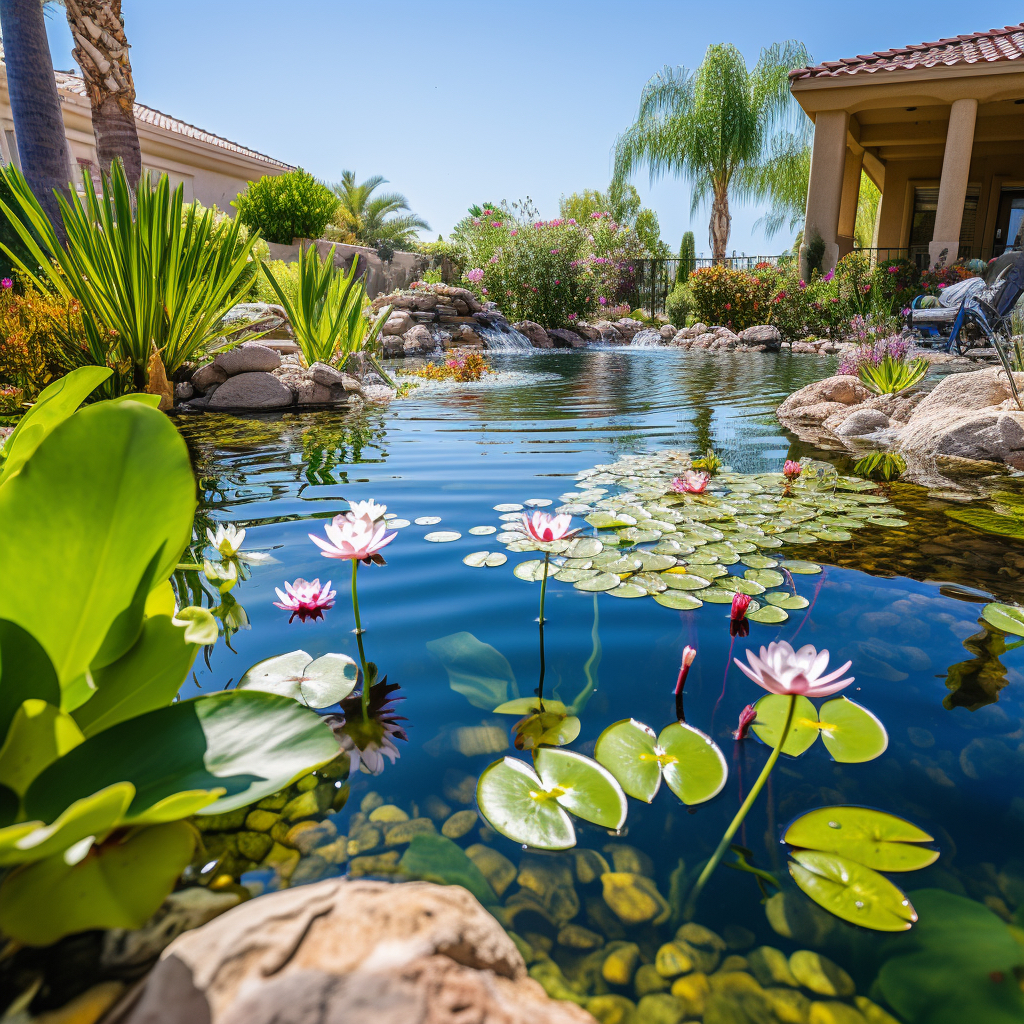In the heart of Las Vegas, a city known for its sparkling lights and immaculate presentation, the last thing you want is a dirty pond. It’s not just about the aesthetics; a poorly maintained pond can lead to a series of problems, both for the pond itself and its inhabitants. Let’s dive into what really goes down when your pond starts to resemble the murky waters of a forgotten swamp.
The Downside of a Dirty Pond
First, let’s understand what we mean by ‘dirty’. A pond becomes dirty when there’s an excess of organic matter like fallen leaves, uneaten fish food, koi fish waste, and the dreaded algae. This build-up doesn’t just cloud the water; it can disrupt the entire ecosystem of the pond.
- Algae Overload: When your pond is dirty, algae can thrive. While some algae are normal, too much can deplete oxygen levels in the water, stressing your fish and harming other aquatic life.
- Poor Water Quality: Accumulation of waste leads to high levels of nitrates and phosphates, which are harmful to fish and can cause foul odors. This imbalance can make your pond less of an oasis and more of a hazard.
- Health Risks for Fish: Dirty water is a breeding ground for bacteria and parasites, putting your fish at risk of diseases. It’s like having a pool party in contaminated water – not the kind of splash you want your fish making.
- Equipment Strain: When debris accumulates, it can clog filters and pumps, reducing their efficiency and lifespan. This means more maintenance headaches and potential costs for you.
Spotting the Signs of a Dirty Pond
Knowing the signs of a dirty pond is crucial in preventing these issues:
- Cloudy or Discolored Water: The first telltale sign. If you can’t see your fish clearly, it’s time to investigate.
- Algae Bloom: Green, brown, or red algae covering the surface or sides of your pond.
- Bad Odor: A healthy pond shouldn’t smell foul. If there’s a stench, it’s a clear sign of imbalance.
- Fish Behavior: Are your fish gasping at the surface or showing signs of lethargy? They might be struggling with poor water quality.
The Domino Effect of Neglect
Letting your pond’s condition slide can create a domino effect of ecological imbalance. It starts with the water quality and moves through every part of the pond’s ecosystem. Here’s what happens:
- Decreased Oxygen Levels: As algae and waste decompose, they consume oxygen, leaving less for the fish and beneficial bacteria.
- Bacterial Growth: Harmful bacteria thrive in dirty water, leading to diseases in fish and other wildlife.
- Insect Infestation: Stagnant, dirty water can attract mosquitoes and other pests, turning your pond into a bug haven.
- Plant Decline: Aquatic plants need clean water to thrive. Dirty water can choke out these plants, further unbalancing the ecosystem.
Prevention and Maintenance
Keeping your pond clean isn’t just about aesthetics; it’s about maintaining a healthy ecosystem. Here are some key maintenance tips:
- Regular Cleaning: Skim the pond’s surface for debris and clean the filters regularly.
- Proper Feeding: Overfeeding fish can lead to excess waste. Feed them only what they can consume in a few minutes.
- Adequate Filtration: Ensure your pond has a suitable filtration system for its size and the number of fish.
- Water Treatments: Use appropriate treatments to maintain water quality and clarity.
When to Call the Pros
Sometimes, despite your best efforts, a pond can get out of hand. This is where professionals like Pond Builders Las Vegas (PBLV) come in. Here’s when you should consider calling them:
- For a Deep Clean: If the pond is severely neglected, a professional deep clean might be necessary.
- Expert Advice: Pros can provide tailored advice on how to maintain your specific pond.
- Regular Maintenance: Setting up a regular maintenance schedule with professionals can keep your pond in top condition year-round.
FAQs About Pond Maintenance
To wrap up, let’s tackle some common questions about keeping your pond clean:
- How often should I clean my pond?
Basic cleaning should be done weekly, while a more thorough clean can be monthly or seasonally, depending on the pond’s size and setup. - Can I use tap water to refill my pond?
Yes, but it’s important to treat it to remove chlorine and chloramines, which are harmful to fish. - What is the best way to control algae?
Combining regular cleaning, proper filtration, and controlling nutrients in the pond (like from fish waste and decaying plants) are effective strategies. - Is it normal for a pond to have some algae?
Yes, some algae are normal and even beneficial, but it’s all about balance.
In conclusion, maintaining a clean pond in Las Vegas is about more than just keeping up appearances; it’s about creating a sustainable, healthy environment for your aquatic friends and plants. With regular maintenance and a bit of help from the pros when needed, your pond can be a sparkling jewel in the heart of the desert. Remember, a clean pond is a happy pond!



